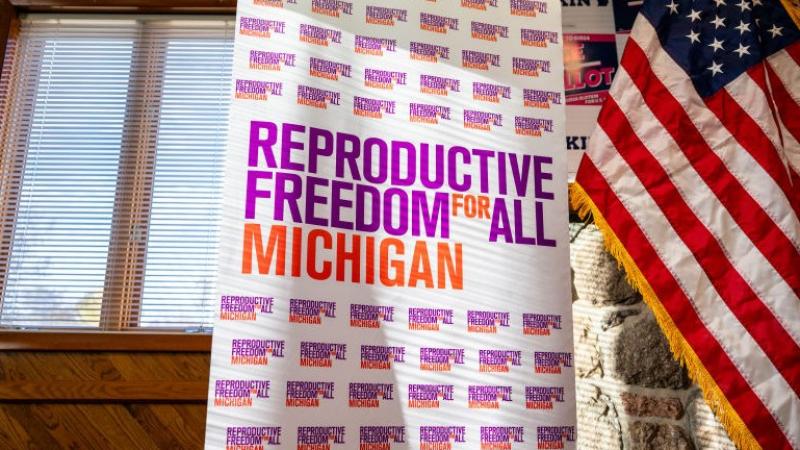Ohioans to vote on abortion constitutional amendment in Nov., as other states mull options for 2024
Three states have already passed pro-abortion constitutional amendments after the U.S. Supreme Court's "Dobbs v. Jackson Women's Health Organization" decision.
Ohio voters will have the opportunity on Nov. 7 to vote for or against a constitutional amendment that would establish a right to abortion. Other states are also weighing their options for the 2024 presidential election.
Ohio voters will be voting on a ballot measure that would add an amendment to the state constitution that creates a right to abortion. The ballot measure was proposed after the U.S. Supreme Court's 2022 decision in Dobbs v. Jackson Women's Health Organization, which overturned Roe v. Wade and allowed states to pass their own laws regarding abortion. Roe created a federal constitutional right to abortion for more than 50 years.
The proposed amendment creates “a right” for “[e]very individual” to both “make and carry out one’s own reproductive decisions, including but not limited to decisions on: 1. contraception; 2. fertility treatment; 3. continuing one’s own pregnancy; 4. miscarriage care; and 5. abortion.”
The amendment proposal also states, “abortion may be prohibited after fetal viability. But in no case may such an abortion be prohibited if in the professional judgment of the pregnant patient’s treating physician it is necessary to protect the pregnant patient’s life or health.”
Ohio Gov. Mike DeWine (R) cut an ad for Protect Women Ohio, a coalition of pro-life groups, discussing issues with the ballot measure.
"Fran and I have never done an ad before for a statewide issue or even a local issue but we both feel very strongly about this and I think whether you’re pro-choice or pro-life the constitutional amendment that we will be voting on in a couple of weeks just goes way, way too far," DeWine told Fox News.
DeWine warned that parental consent wouldn’t be required for minors seeking abortions and that unborn babies could be aborted simply for having Down syndrome. Ohio currently has laws requiring parental notification and prohibiting abortion solely for an unborn baby having Down syndrome.
In an August special election, Ohio voters decided against a measure that would have increased the threshold to pass a constitutional amendment to require a 60% "yes" vote. Instead, a simple majority will suffice. Ohio currently has a six-week abortion ban law, but it has been blocked from going into effect by a state judge, according to The Ohio Capital Journal.
More than 100 black faith and community leaders in Ohio have urged voters to reject the pro-abortion proposal.
“This is a moral issue and for the Black community in particular, it is a life-or-death matter,” the leaders wrote in a public statement. "Only 13 percent of Ohio’s population is Black, yet 48 percent of abortions undergone by residents of our state are performed on Black women – a tragic and difficult reality that our community cannot ignore,” the statement says.
The statement added that the proposal “is more extreme than Roe v. Wade, and it will allow for painful, late-term abortions through all nine months of pregnancy – even after an unborn baby can feel pain.”
Other states have also considered constitutional amendments regarding abortion, with most of the related elections affirming a state's right to allow abortion.
In August, Kansas voters rejected a pro-life constitutional amendment, after Kentucky voters did the same last November. Meanwhile, in California, Michigan and Vermont, voters have already accepted pro-abortion constitutional amendments.
Other states are in the process of considering constitutional amendments protecting a right to abortion.
In Colorado, pro-abortion advocates are seeking to put a constitutional amendment on the ballot next year that would strengthen abortion protections. Colorado currently allows for abortion under state law.
Nevada's pro-abortion advocates are working to propose a constitutional amendment that would enshrine abortion protections. The proposed amendment needs 103,000 signatures of registered voters by June 26 to appear on the 2024 presidential election ballot. If the amendment passes with a simple majority, then it will be placed on the statewide ballot again in 2026. Only if the proposed amendment passes the second time will it be added to the state constitution.
Nevada state law already allows abortion up to 24 weeks of pregnancy, and later in special circumstances.
Similarly, Arizona, Florida, and Missouri all have constitutional amendment ballot proposals that would strengthen abortion protections if they make it onto the 2024 general election ballot and are passed by the voters.
By contrast, Iowa, Nebraska, Pennsylvania, and South Dakota all have ballot proposals that would limit abortion or prevent abortion from becoming a right if they make it onto the 2024 general election ballot and are passed by the voters.
Maryland and New York have proposed constitutional amendments protecting abortion that will appear on the Nov. 2024 election ballot.
The funding of the campaigns – both for and against – is an issue largely overlooked but hotly debated by those who are following the issue. Ms. Magazine accuses large corporations of being not pro-women, claiming "their massive contributions to anti-abortion state lawmakers" belies those same companies' woke advertising images.
By contrast, Vox lists several billionaires who have been funding pro-abortion candidates and causes, including Michael Bloomberg, Andrea Soros, George Soros’s daughter, Jennifer Allan Soros, the billionaire’s daughter-in-law and Democratic Party mega-donor Sam Bankman-Fried. He is currently on trial for fraud, money laundering and other offenses.
The Facts Inside Our Reporter's Notebook
Links
- vote on a ballot measure
- proposed amendmen
- amendment
- ad for Protect Women Ohio
- DeWine told Fox News
- urged voters to reject
- leaders wrote in a letter
- letter added
- Kansas voters rejected
- Kentucky voters
- accepted pro-abortion constitutional amendments
- constitutional amendment on the ballot
- propose a constitutional amendment
- Nevada state law
- Arizona
- Florida
- Missouri
- Iowa
- Nebraska
- Pennsylvania
- South Dakota
- Maryland
- New York
- Ms. Magazine accuses large corporations
- Vox lists several billionaires














